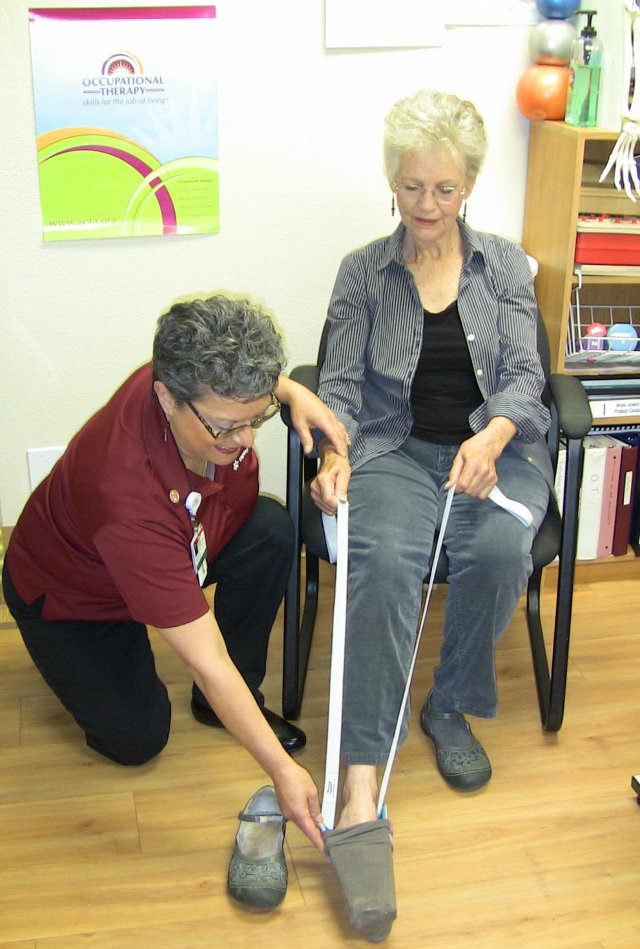San Andreas, CA…Susan Wright’s career as an Occupational Therapist spans some 31 years and she says it has never seemed like work. “It’s more like helping out a friend,” she notes. “OT helps people be independent by figuring out ways for them to handle the activities of daily living.” Susan joined the Mark Twain Medical Center team in January as full-time Occupational Therapist. Her office in the Outpatient Services Center at MTMC reflects her training as a hand therapy specialist – but she reaches far beyond her specialty to help people regain their independence.
She explains her field is often misunderstood. “Most think Occupational Therapy is related to job skills and conditions which affect people in the workplace – it is much more than that. We help people overcome the challenges of traumatic injuries, stroke or other disabilities and depression; and assist with children confronting learning disabilities. Our job is to be sure people can care for themselves – to achieve and maintain a healthy balance between work, leisure and self-care.”
Susan began her career as a Home Health Aide, assisting people with routine activities as they recovered from illness or injury or faced the challenges of aging. “I love people,” she says, “so I was drawn to helping people in this way – it wasn’t like working to me. I really liked it and before long I decided to take the next step down the career path by studying to be an Occupational Therapist.” She attended a community college and then earned her Occupational Therapist Registered, Licensed (OTR/L) degree at San Jose State University.
Her years in home health care are a rich resource for her OT career. Susan explains, “Our goal in OT is to
get people back to doing what they used to do or adapt their surroundings so they can accomplish those
tasks in another way. When I was visiting people in their homes, I would often arrive to find a messy
situation with them in their robe or maybe still in bed because they didn’t think they could take care of
themselves. I worked with them to achieve simple tasks like taking a shower, getting dressed, fixing
something to eat and engaging in everyday activities.”
“By the time I left, they usually were dressed, sitting in a chair with their hair fixed and looking forward
to the rest of the day. That was the big payoff for me. These people were engaged in everyday life once
again.”
Creative thinking inspired her approach. In the case of a woman who could not walk out to her trash can,
Susan rigged up a pulley system to drag the can closer to the kitchen door when needed. For a fisherman who’d lost several fingers in an accident, she adapted his fishing pole and helped him relearn his casting skills. She mounted a needlepoint frame to the edge of a table for a stroke survivor who longed to resume her favorite hobby. Susan explains, “A person gets a real sense of accomplishment when they can do things for themselves. Something as simple as adapting a knife and fork can make a big difference.”
“That’s what I am doing here at MTMC with Occupational Therapy,” Susan notes. “I am looking at the
broad picture of how to best re-engage a person in their everyday life. We often use arts and crafts to help
people achieve their mobility goals,” she adds. “If someone’s goal is to raise their arm above their head,
we might get them going on an art project and then gradually raise the canvas so they have to reach up
higher and higher to keep it going. Hobbies like crochet and golf are great ways to ease people back into
motion.”
“I also work with caregivers, family members and spouses to set things up at home so a patient can do
things for themselves and have a feeling of independence. The top priorities are safety, independence,
keeping people in their homes and out of nursing homes.” In addition to her outpatient clients, Susan also
provides in-patient services at MTMC. “We provide bedside OT, losing no time in the recovery process,”
she notes.
She mentions a young couple injured in a motorcycle accident as an example of OT success. “They both
had severe injuries – the husband had a broken leg and the wife had a broken arm. They wanted to
recover at home so we worked to find ways they could assist each other with daily tasks and they
managed just fine.”
Prior to joining MTMC, Susan was a part-time Occupational Therapist at Sutter Amador Hospital in
Jackson for 10 years and then two additional years for the Sutter Amador Hospital Foundation Clinic.
She and her husband Ernie, who is retired, have lived in Pioneer in Amador County for 18 years. They
have two adult children. Daughter Katie is following her mother’s footsteps, now studying to be a
Certified OT Assistant at Sacramento City College, and their son David lives in Idaho.
Susan welcomes anyone with questions about OT to give her a call at 209-754-2533. A physician referral
is necessary to access OT services at MTMC, but she is always eager to explain her specialty and how it
might help someone regain their independence.




